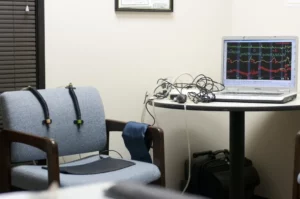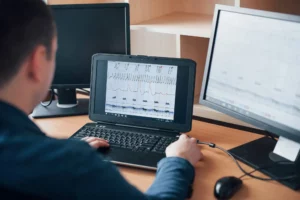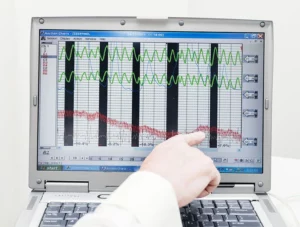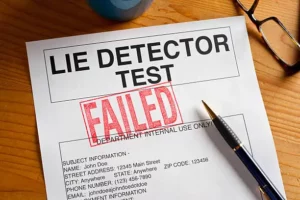So you have an upcoming polygraph test and you’re feeling nervous? Don’t worry, you’re not alone. Polygraph tests can be intimidating, but with the right approach and mindset, you can pass. This guide will walk you through everything you need to know before.
Understanding How a Polygraph Works

A polygraph, also known as a lie detector test, is a procedure that measures and records several physiological indicators such as blood pressure, pulse, respiration, and skin conductivity in response to a series of questions. The idea is that when someone lies, their body exhibits subtle but detectable changes in these indicators.
The test is conducted using medical-grade equipment attached to your body to measure and record your physiological responses. The polygrapher then compares your baseline readings against your reactions to the actual questions to detect any deception.
Preparing Your Mindset
Half the battle of passing a polygraph test is mental preparation. Having the right mindset can help you stay calm, focused and ensure your responses are aligned with the facts. Here are some tips on preparing mentally:
Remind yourself that you have nothing to hide. If you are honest and tell the full truth, you should pass the test without problems. Let this give you confidence.
Don’t try to outsmart the machine. Attempting countermeasures to manipulate the test results is risky and often detectable by experienced polygraphers.
Get a good night’s rest beforehand. Being well-rested will help you remain relaxed, alert and cooperative during the actual test.
Avoid stimulants before the test. Caffeine, energy drinks, and other stimulants can amplify nervousness and cause erratic responses.
Focus on remaining calm and still. Take deep breaths to manage nerves. Avoid fidgeting or excessive movement which can affect readings.
Be cooperative and forthcoming. Trying to conceal information will only raise red flags. Answer honestly and provide any details requested of you.
Diet and Lifestyle Adjustments

The days leading up to the polygraph test are a good time to adjust your diet and lifestyle habits to optimize mental clarity, reduce anxiety and nervousness.
Hydrate well in the days before. Dehydration can exacerbate nerves and cause inaccurate readings. Drink plenty of water.
Avoid alcohol and recreational drugs. These substances negatively impact focus and physiological responses. Abstain a few days beforehand.
Reduce caffeine intake. As mentioned, caffeine can amplify anxiety. Taper intake a couple days before the test.
Eat light the day of the test. Heavy meals directly before the test can cause discomfort and digestive issues. Stick to light snacks.
Get mild exercise. Light walks, yoga or stretching the day before can help relieve tension and pent-up stress.
Get adequate sleep. Shoot for 8 hours in the nights leading up to the test to be well-rested and relaxed.
Dressing for Comfort
Your attire can impact your comfort and ability to remain still during the actual test. Follow these dressing tips:
- Wear comfortable, loose-fitting clothing free of constricting belts, tight collars or waistbands.
- Wear short or loose sleeves to allow blood pressure cuff placement on bare skin.
- Avoid noisy jewelry or accessories that could distract you and interfere with test readings.
- Consider dressing in breathable layers in case the room temperature fluctuates and causes discomfort.
- Wear garments free of wiring, thick seams or rivets that could interfere with sensor placement.
- Remove piercings or jewelry that may get in the way of sensors or cause discomfort when pressed on.
Familiarizing Yourself with the Process

Understanding how the actual test will unfold can help minimize surprises that provoke anxiety on the day.
The general polygraph test process includes:
- Pre-test interview: The examiner will discuss the test process and review the questions you’ll be asked. Be cooperative and don’t try hiding anything.
- Baseline reading: Sensors will be attached and you’ll be instructed to answer basic questions verifiably true to establish a reaction baseline.
- Question session: You’ll be asked the relevant questions discussed in the pre-test interview. Focus on remaining still and answering honestly.
- Post-test interview: The examiner may review your results and ask for clarification on reactions to any questions. Calmly provide any requested details.
- Analysis: He will analyze the readings and determine if reactions signify deception. Remain patient during this time.
- Results: The examiner will share whether you passed or failed the test.
Arriving Prepared on Test Day
To ensure everything goes smoothly, make sure to:
- Know the test location and arrive early. Being rushed can amplify nerves.
- Follow any pre-test instructions, such as avoiding certain medications or stimulants.
- Use the restroom before the exam. Having to urinate during the test can skew results.
- Have identification documents ready if required.
- Turn off mobile devices and remove smart watches. These can interfere with equipment.
- Avoid gum, candy, cigarettes or other items that must be removed before the test.
- Inform the examiner of any medical conditions or medications that may impact results.
Establishing a Baseline

A crucial part of the polygraph test process is establishing a physiological baseline for comparison against your responses to the actual questions.
To get accurate baseline readings:
- Listen to the examiner’s instructions and follow them precisely. Avoid interrupting or talking excessively.
- Keep movements to a minimum while hooked up to the machine.
- Answer the baseline questions honestly, with “yes” or “no” responses. Do not embellish answers.
- Remain still during the baseline recording period. Avoid adjusting your posture or fidgeting.
- Take slow deep breaths to keep your breathing even and steady.
- Relax your body rather than tensing up. Muscle tension influences readings.
Having a strong, consistent baseline supports the examiner’s ability to accurately interpret your reactions to the key questions.
Remaining Steady During Questioning
When it’s time for the actual relevant questions, keep these tips in mind:
- Listen carefully to each question, and avoid answering too quickly.
- Pause briefly between questions to allow your physiological signs to settle before answering the next.
- Be truthful in your verbal responses and with your body reactions. False responses often register as deception.
- Maintain the same breathing pace and posture you had during the baseline recording. Avoid fidgeting or adjusting position.
- If you need a question repeated or clarified, politely request that from the examiner. Don’t let confusion cause anxiety.
- If you answer truthfully and your body reacts accordingly, you should pass this phase without problems.
Handling Post-Test Interviews

After the readings have been analyzed, the examiner may conduct a post-test interview to ask you about any questionable reactions. How you handle this interview can impact the overall results.
- Avoid getting defensive if asked about a particular response. Just answer calmly and honestly.
- Provide matter-of-fact clarification on your responses if requested. Don’t get confrontational.
- If you’re not sure why you reacted a certain way, say so. Don’t make up false explanations.
- Stick to the facts and don’t change key details. Contradicting yourself raises red flags.
- Be compliant if the examiner needs to repeat certain questions to confirm responses.
- Thank the examiner for their time and for giving you the opportunity to participate in the polygraph.
- If comfortable, ask when you can expect to receive the final results. But don’t pressure the examiner.
Handling the post-test interview professionally demonstrates you have nothing to hide and have been fully forthcoming. This leaves a positive final impression as the examiner makes their assessment.
Waiting for Results
The time period after completing the test and receiving the results can produce anxiety. Here are some ways to pass the time without driving yourself crazy:
- Remind yourself you followed all preparation advice and were truthful. This gives you the best chance of passing.
- Avoid fixating on your responses to particular questions. The results depend on the entire test.
- Don’t discuss the test questions in depth with others while awaiting results. This can create confusion.
- Engage in relaxing activities like reading, listening to music, or spending time outdoors.
- Stay busy with work, hobbies or making plans with friends and family.
- Be patient with the examiner. Polygraph results are not assessed instantly. The analysis takes time.
- If results are delayed longer than expected, politely check in with the examiner. But avoid harassing them.
The waiting period can be difficult. But stay confident in your preparation efforts and honest responses. Keep busy and trust you did all you could to pass.
Next Steps if You Fail

While the goal is to pass on the first try, sometimes examinees fail due to nervousness, poor approach or attempting to hide something. If you fail your first polygraph test, don’t panic.
- Request feedback from the examiner on which questions you showed deception on or why they think you failed. Listen objectively.
- Honestly assess if you tried to hide anything or weren’t fully truthful. A follow-up test will expose this.
- Review areas where your preparation was lacking and improve them before the next test.
- Wait the required number of days before attempting the test again. Use this time to practice relaxation techniques.
- Stick to the preparation guidance, tell the full truth and remain calm during the re-test.
With maturity and improved preparedness, it is very possible to pass a polygraph test on the second try if you remain honest and cooperative. View it as a learning experience.
In Closing
Polygraph tests can make anyone feel nervous. But going into your first one ready both mentally and physically will help you pass with flying colors if you simply tell the truth. Have confidence, focus on remaining calm, and be totally honest and cooperative throughout the process. With the right mindset and maturity, you’ll find the experience is not nearly as stressful as anticipated. Best of luck with your polygraph!

